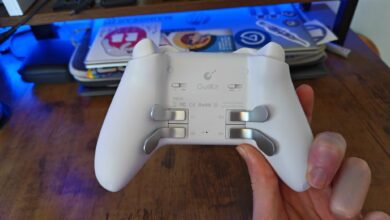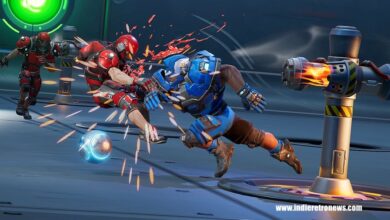Digital Eclipse turns their sights on one of the stalwarts of independent British game development.
I should preface this week’s update with mention of a large handful of games that were re-released between last week and now: Electronic Arts dropped a whole bunch of classic games onto Steam, but rather than spotlight those games now, I’d rather draw attention to the fact that, in doing so, they managed to push the just-released and just-review retro action game Berserk Boy off Steam’s front page mere minutes after it launched — and, to be sure, that can’t have been deliberate, but at the same time, I think the likes of Sim City 3000 and Sid Meier’s Alpha Centauri will do just fine without me gassing ’em up.
ARCADE ARCHIVES
Mouser
- Platform: Nintendo Switch, PlayStation 4
- Price: $7.99 / €6.99 / £6.29
- Publisher: Hamster / UPL
What’s this? A multi-stage, single-screen action game, originally developed and distributed in Japan by Universal Playland in 1983 and elsewhere by Cosmos, with its sole home conversion being a Sony-publish port for MSX. Players control the tomcat Nyanta on a mission to rescue their kidnapped girlfriend from a gang of mice; the player must grab the blue mice while avoiding the red mice in order to materialize the ladders that will allow them to reach their girlfriend at the top of the stage, while grabbing the fish grants them a brief burst of invincibility.
Why should I care? Of the many Donkey Kong clones out there, this one might be closest in quality to its source material, and the enemy variety’s a little ahead of other contemporary games that borrowed this format.
Useless fact: This game was designed, drawn and composed by future Wonder Boy creator Ryuichi Nishizawa under orders to directly mimic Donkey Kong, and the programming was alleged to have been devised by directly reverse-engineering DK’s code; it also happened to be the final game released by Universal Playland before their transition to UPL, and it has been suggested that this change was motivated by the workers getting fed up with being told to rip off other games.
EGG CONSOLE
Ys II (PC-8801)
- Platform: Nintendo Switch (worldwide)
- Price: $6.49 / ¥880
- Publisher: D4 Enterprise / Nihon Falcom
What’s this? The second episode in Nihon Falcom’s signboard action-RPG series, originally developed for the PC-8801 microcomputer in 1988 and ported to several contemporary microcomputers, as well as the Famicom, with successive double-pack remakes in later years that began with Ys Books I & II for PC Engine/TurboGrafx-16 and currently bookended by Ys I & II Chronicles+ on PC. This game directly continues the story of the original Ys and sees the hero Adol arrive on the titular floating island with the purpose of deciphering the secrets of the Books of Ys and ridding the land of evil, a cause that is once again executed by bumpin’ into stuff but with the added option of occasionally casting a magic spell.
Why should I care? Well, I imagine quite a few of you might’ve recently bought the first game and want to play the back half, so there’s one reason. For those who haven’t, I’d suggest you do, seeing as this game specifically references the developments of the first game and offers payoffs for its many cliffhangers, but in terms of core playability and variety, this game does offer a more satisfying standalone experience than the original, with a wider variety of locales, slightly smoothed-over mechanics and quality enhancers and a heavier focus on production, including the oft-referenced opening and ending cinematics.
Language barrier? As with the first game, this release is being presented with exactly as much English text as was present in 1988: in other words, certain menus and proper nouns, but not much else, which might cause problems for those who haven’t played other translated versions of the game and don’t know all the quest conditions or objectives.
NINTENDO SWITCH ONLINE
March ’24 update: Dr. Mario, Mario Golf & Mario Tennis (Game Boy/Color)
What’re these? The greyscale version of Nintendo’s hit pill-dropping puzzle game and the first handheld entries in Camelot’s long-running Mario-universe sports games. (Mario Tennis and Golf look to have all their N64 Transfer Pak-exclusive content unlocked by default, but these versions don’t allow you to share data with their N64 counterparts if you have the NSO+ N64 app, and I don’t believe there’s any way to unlock the transfer-exclusive contents in the N64 games, either.)
Why should I care? You want a refresher on the features and format that Camelot debuted with their handheld sports games back on Game Boy Color, so as to understand why people complain about the feature set of the modern games, or you’re simply more nostalgic for the Game Boy version of Dr. Mario rather than the ever-so-slightly-better, available-for-ages NES version.
Worthless opinion: It’s been a minute or two, but I recall Mario Tennis being the stronger GBC outing, and Mario Golf: Advance Tour being the stronger of the GBA sequels, but you tell me.
OTHER
Llamasoft: The Jeff Minter Story
- Platform: PlayStation 5, PlayStation 4, Xbox, Nintendo Switch, PC via Steam (worldwide)
- Price: $29.99 or equivalent (trilogy)
- Publisher: Digital Eclipse
What’s this? The second entry in Digital Eclipse’s Gold Master series of “interactive documentaries”, focused on the early career of veteran British developer Jeff Minter and his software brand Llamasoft; in addition to offering authentic and enhanced playable versions of several dozen games and demos spanning 1981 to 1994, this collection also offers documentary footage (primarily diverted or salvaged from the upcoming Minter documentary Heart of Neon), scans of documents and other ephemera, a development timeline and other trivia pertaining to Minter’s life and work.
Which games are included? This collection offers 42 games across eight different platforms, from the humble Sinclair ZX81 to the mighty(?) Atari Jaguar, virtually all of which are frenetic action games in the classic arcade mold; I’ll refer you to the website for the full list, but select highlights include multiple versions of Minter’s more famous titles (Gridrunner, Hovver Bovver, Attack of the Mutant Camels), the interactive light synths Psychedelia and Colourspace, the killer-app Jaguar game Tempest 2000, the brand-new, Digtal Eclipse-produced Gridrunner Remastered and, perhaps most intriguingly, a playable demo of Attack of the Mutant Camels ’89, a game in development for the never-released Konix Multi-System hardware.
Why should I care? Compared to the previous Gold Master release, which primarily focused on one game, helmed by someone who’s been meticulously cataloguing and sculpting their own history for most of their life, Llamasoft might offer less of a through-line for the uninitiated — you’ll be presented with a succession of tidbits that state and reinforce the notion that Minter is a hippie who marches to the beat of their own drum, and a defender of the independent developer spirit that existed before the mass corporatization of the gaming industry, but without a whole lot ot exposition on anything in particular… but perhaps that, too, is reflective of the unassuming and ever-active nature of Minter’s early oeuvre. Gridrunner’s still fun, as it happens.
Helpful tip: In typical Minter fashion, he’s commemorated this release by dumping a bunch of extra unused/unreleased archival stuff online, including the source code for Llamatron.
Star Wars: Battlefront Classic Collection
- Platform: Nintendo Switch, PlayStation 4/5, Xbox, PC via Steam (worldwide)
- Price: $35.01 or equivalent
- Publisher: Aspyr Media
What’s this? A double-pack containing enhanced ports of the first two games in the multiplayer-centric large-scale first-person war series Star Wars: Battlefront, originally developed by Pandemic Studios and published by LucasArts for PlayStation 2, Xbox, PC and Mac in 2004 and 2005, respectively (and not to be confused with the Electronic Arts-published games of the same name from a few years ago); this collection promises framerate and resolution bumps for the original games, on top of a smattering of bonus maps and characters across both games and looser restrictions on which modes can be played on which maps, as well as split-screen local multiplayer and the trademark online multiplayer mode for up to 64 players.
Why should I care? Well, I say “promises” because, by all accounts, these ports do not deliver, with widespread reports of intense lag and a death of servers rendering the game all but unplayable, on top of severe technical issues including framerate-cap bugs, broken audio and control glitches. Should they be fixed (and, given Aspyr’s track record with Star Wars-related ports in particular, this is far from a given), you might at least get a kick out of what passed for massively-multiplayer online action on a PS2, especially given that you might even get to play it with actual people and not just bots.
Helpful tip: Owning the original versions on PC won’t give you a free upgrade to the new ones but it will allow you to buy them at a slight discount, should you even want to.
UOOTOY 3671
- Platform: PC via Steam (worldwide)
- Price: $14.99 or equivalent
- Publisher: Mindware
What’s this? A remake of the 1984 fixed-screen puzzle-action “slapstick game” UOOTOY, which was originally programmed for the Fujitsu FM-7 computer by creator TENDON and published in the August ’84 issue of the computer magazine I/O and commercialized for various Japanese computers soon after; this version offers enhanced visuals, framerate and input response, new music by Namco golden-age arcade veteran Junko Ozawa and former Nintendo composer Daisuke Shiiba, a new set of 100 stages to complement the 100 stages from the original game, a secondary playable character and a fully-featured level editor.
Why should I care? When one thinks “early ’80s action-puzzle computer game”, one might automatically picture something deterministic and prescriptive, but that’s certainly not the case here: the puzzle aspect of this game primarily comes from learning the specifics of each gimmick and devising a way to navigate a stage that might employ eight intersecting gimmicks at once — think less Lode Runner, more charmingly obnoxious Mario Maker stages.
Helpful tip: This game’s getting a boxed release in Japan next week, if that’s your thing.
ROM HACKS & TRANSLATIONS
Persona: Ikuu no Tou-hen (Japanese cellphone, by way of G-MODE Archives) translation patch (PC)
Y’know those old Japanese phone game re-releases that I share every other week? The ones I’m convinced nobody aside from me is actually playing (outside of Japan, anyway)? Turns out that the ones with ties to big, still-running console RPGs with global popularity — like, say, this side-story to the original Persona — tend to attract a little more attention than some of the others, to the point where people are even translating ’em! You’ll need to own the base game on Steam in order to apply this patch, of course.
LIMITED-EDITION PHYSICAL PRINT RUNS
Grandia HD Collection (PS4, Xbox) physical versions via Limited Run Games
- Price: $54.99
- Availability: from March 15, 10:00 to April 13, 23:59 Eastern
Ahead of next week’s long-overdue PS/Xbox ports of the recent Grandia I & II remasters for PC/Switch, Limited Run Games is opening orders for physical versions — no collectors’ packages, it seems; just straight-ahead physical prints with relatively few accoutrements. (I cannot guarantee that these ports won’t have their own bugs, but the PC/Switch versions were ultimately patched to remove the majority of the technical issues that plagued them at launch; unfortunately, certain aesthetic decisions, like Grandia’s hard-baked sprite filter, aren’t going anywhere.)







